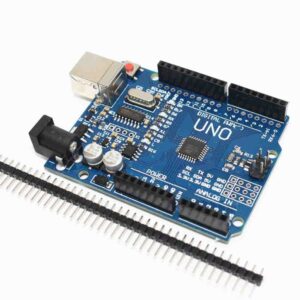ATMEGA16U2 Arduino Mega 2560 R3 Improved Version CH340G Board
19 in stock
- Microcontroller CH340
- Operating Voltage 5V
- Input Voltage (recommended) 7-12V
- Input Voltage (limits) 6-20V
- Digital I/O Pins 54 (of which 15 provide PWM output)
- Analog Input Pins 16
- DC Current per I/O Pin 40 mA
- Dimensions : 111 x 54 x 12 (LxWxH) mm.
900.00₹ (Exc. GST)
19 in stock
CompareArduino board is an open-source microcontroller board which is based on Atmega 2560 microcontroller. The growth environment of this board executes the processing or wiring language. These boards have recharged the automation industry with their simple to utilize platform wherever everybody with small otherwise no technical backdrop can start by discovering some necessary skills to program as well as run the Arduino board. These boards are used to extend separate interactive objects otherwise we can connect to software on your PC like MaxMSP, Processing, and Flash.
The Arduino Mega is a microcontroller board based on the ATmega2560. It has 54 digital input/output pins (of which 14 can be used as PWM outputs),16 analog inputs, 4 UARTs (hardware serial ports), a 16 MHz crystal oscillator,a USB connection, a power jack, an ICSP header, and a reset button. It contains everything needed to support the microcontroller; simply connect it to a computer with a USB cable or power it with a AC-to-DC adapter or battery to get started. The Mega is compatible with most shields designed for the Arduino Duemilanove or Diecimila.
The Mega 2560 R3 also adds SDA and SCL pins next to the AREF. In addition, there are two new pins placed near the RESET pin. One is the IOREF that allow the shields to adapt to the voltage provided from the board. The other is a not connected and is reserved for future purposes. The Mega 2560 R3 works with all existing shields but can adapt to new shields which use these additional pins.
Features:
- ATmega2560 microcontroller
- Input voltage – 7-12V
- 54 Digital I/O Pins (14 PWM outputs)
- 16 Analog Inputs
- 256k Flash Memory
- 16Mhz Clock Speed
USB Over-current Protection
The Arduino Mega 2560 R3 Board has a resettable polyfuse that protects your computer’s USB ports from shorts and overcurrent. Although most computers provide their own internal protection, the fuse provides an extra layer of protection. If more than 500 mA is applied to the USB port. The fuse will automatically break the connection until the short or overload is removed.
Input and Output
Each of the 50 digital pins on the Mega R3 Android Accessory Development Kit (ADK) can be used as an input or output; using pin Mode(), digital Write(), and digital Read() functions. They operate at 5 volts. Each pin can provide or receive a maximum of 40 mA . has an internal pull-up resistor (disconnect by default) of 20-50k Ohm. In addition, some pins have specialized functions:
- Serial : 0 (RX) and 1 (TX), Serial 1: 19 (RX) and 18 (TX), Serial 2: 17 (RX) and 16 (TX), Serial 3: 15 (RX) and 14 (TX). Use to receive (RX) and transmit (TX) TTL serial data. Pins 0 and 1 are also connected to the corresponding pins of the ATmega8U2 USB-to-TTL Serial chip.
- External Interrupts: 2 (interrupt 0), 3 (interrupt 1), 18 (interrupt 5), 19 (interrupt 4), 20 (interrupt 3), and 21 (interrupt 2). These pins can be configured to trigger an interrupt on a low value, a rising or falling edge, or a change in value. See the attach Interrupt() function for details.
- PWM: 2 to 13 and 44 to 46. Provide 8-bit PWM output with the analog Write() function.
- SPI: 50 (MISO), 51 (MOSI), 52 (SCK), 53 (SS). These pins support SPI communication using the SPI library. The SPI pins are also broken out on the ICSP header, which is physically compatible with the Uno, Duemilanove, and Diecimila.
- USB Host: MAX3421E.
Note : Cable is not included in Board.
Package Includes :
- 1 x Arduino Mega 2560 R3 Board CH340- Clone Model
Based on 0 reviews
Only logged in customers who have purchased this product may leave a review.






There are no reviews yet.